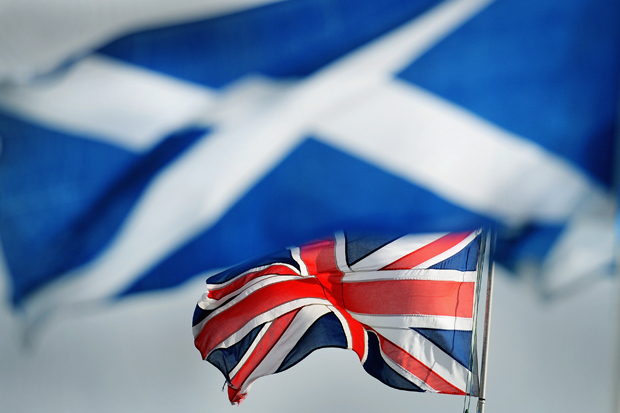It is a sign of how no one expects Scotland to vote yes in September that no serious planning has been done about the consequences. By contrast, Gladstone shut himself away for days in the spring of 1886 drawing up the Bill that would have bestowed Home Rule on the Irish, plotting what it would mean for almost every aspect of the shared lives of Ireland and Britain. Scotland already has what Parnell would have called Home Rule. The creation of a Scottish Free State would be a different matter, and few have started to assess what that would mean.
This is a pity, not just for practical reasons, but for emotional ones too. Much of the argument over the Union is rooted in nostalgia and sentimentality: so many of the partisans either want to be Braveheart or Sir Walter Scott. There will be people on both sides who will find it hard to accept the result, whatever it may be. But I suspect that despite the trauma of separation, England would end up benefiting from Scotland voting for divorce.
It would be a matter of indifference to most outside Scotland whether an independent nation were instantly admitted into the European Union, or had to get in the queue behind Serbia. But the currency union would have to end. When George Osborne said this a few months ago it was construed as a threat, but the Scots would have been better to take it as a warning and plan accordingly. The Bank of England would cease to be the lender of last resort. The English taxpayer would no longer have to bear the liabilities of failed Scottish banks. Scotland could use the pound in much the same way as small islands in the Caribbean use the dollar. It would have to accept, as they do, that by doing so it would forfeit ultimate control of its economy. It would find sterling appreciating, without the possibility of devaluation for Scotland, and its cost of borrowing would rise considerably because of the uncertainty of the collateral.
When we weigh such considerations, we start to realise some of the practical benefits to England of Scotland voting yes. Mr Salmond claims Scotland is self-supporting. This is true in the same way that grown-up children who live with their parents are self-supporting. The higher per capita spending that flows north of the border would stay in the English Treasury. Just think what the English (and Welsh, and Northern Irish) could do with it. Scotland has a culture of welfarism: England is seeking to rid itself of one. Separation means one nation no longer has to accommodate these damaging differences. The area north of Leeds and Manchester that Mr Miliband has this week complained is economically underperforming could become home to businesses fleeing what may well have to become a penal taxation regime in Scotland. Indeed, Mr Osborne should stand by to grant special tax status to Carlisle and Newcastle to make them the Cayman Islands of the north.
The proponents of Union say that England’s status would be diminished internationally without Scotland. It is hard to see how matters could get much worse. Apparently our place on the UN Security Council might be under threat. Given that we have more or less surrendered the effectiveness of our armed forces so that Mr Cameron can send large cheques to finance other countries’ space programmes, the great surprise is that our position isn’t fatally undermined already. We are told we could no longer station our nuclear submarines in Scotland’s deep-water ports. We managed to win the second world war despite the Irish denying the Royal Navy access to Irish ports. England would cope.
The political consequences have been caricatured as permanent Tory government, given how rarely Labour has won a majority of seats in England and Wales alone. I suspect the mechanism would be self-adjusting, and the one-party state would not come about: but it would certainly level the playing field. And it would also end the outrageous situation whereby Scottish MPs vote on matters that concern only the constituents of English and, sometimes, Welsh MPs.
It was an outrage, too, that voters in the rest of the United Kingdom were not asked to express in a referendum their views about the Union. Had a campaign been properly run in England about the net contribution the Treasury makes to Scotland, and had some of the anti-English propaganda that flies about routinely in Scotland been given wider currency in an English referendum campaign, the result would have been interesting. Yet perhaps the main reason to hope for separation is that the Prime Minister is said to be considering ceding more powers to Scotland if it votes to stay in the Union, by way of saying ‘thank you’. If the principal outcome is to give the parliament in Edinburgh yet more scope to wring money out of the English taxpayer, the first people to demand a second plebiscite on the Union will not be the Scots.
Got something to add? Join the discussion and comment below.
Get 10 issues for just $10
Subscribe to The Spectator Australia today for the next 10 magazine issues, plus full online access, for just $10.
You might disagree with half of it, but you’ll enjoy reading all of it. Try your first month for free, then just $2 a week for the remainder of your first year.














Comments
Don't miss out
Join the conversation with other Spectator Australia readers. Subscribe to leave a comment.
SUBSCRIBEAlready a subscriber? Log in